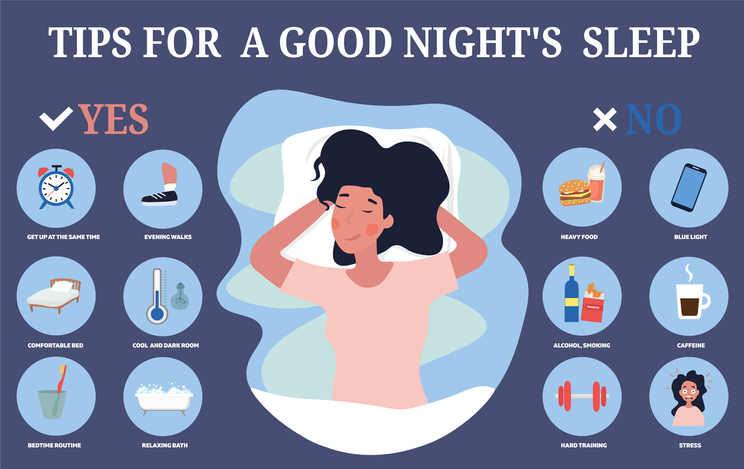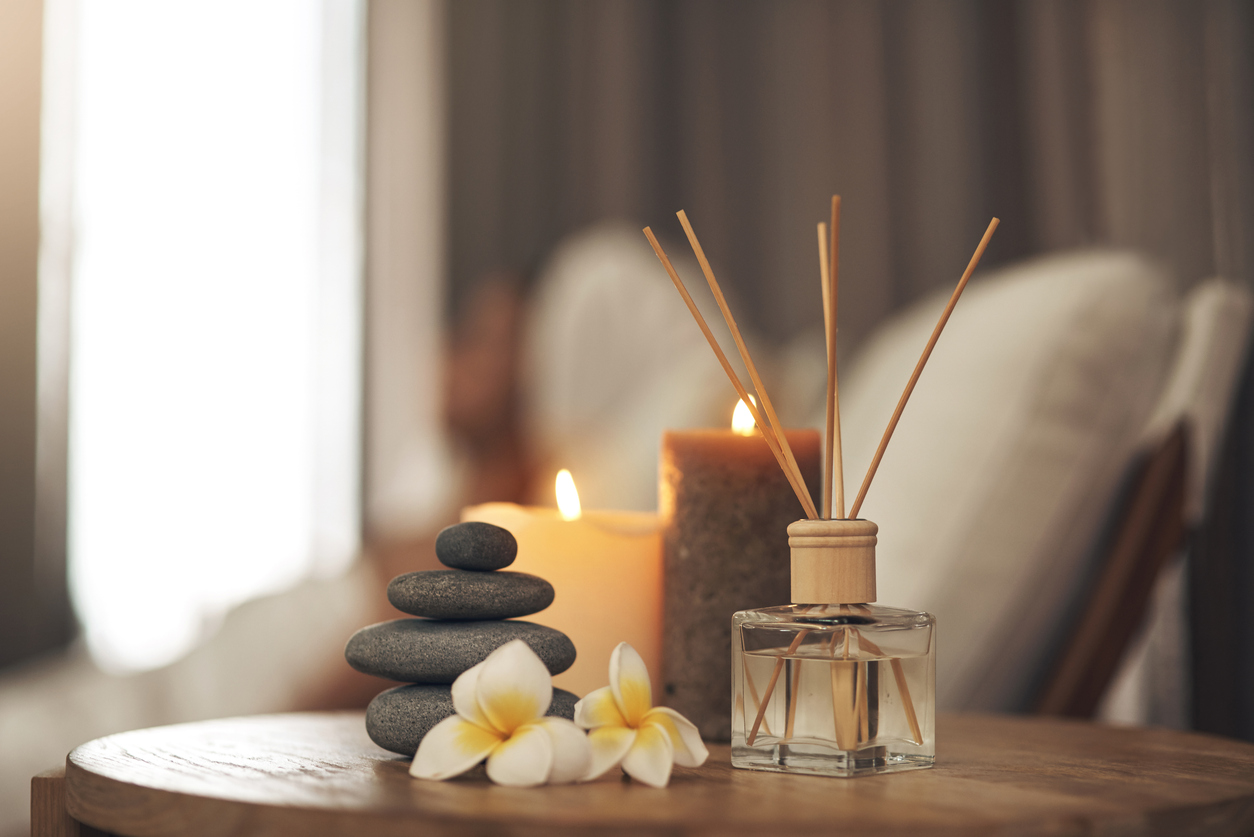Getting a good night’s sleep is crucial for your health and well-being. But for various reasons, many of us struggle to sleep well. If you’re one of those individuals seeking sleep tips to enhance the quality of your sleep, this post is for you. Below, we jump into ten simple yet effective strategies you can adopt to have a more restful night without resorting to medications.
Establish a Consistent Sleep Schedule
Maintaining regularity in your sleep patterns is fundamental to achieving better sleep. This involves setting and adhering to specific times for going to bed and waking up each day. By doing so, you reinforce your body’s natural sleep-wake cycle, also known as the circadian rhythm. Strive to get between 7 and 9 hours of sleep each night. Be attentive to how you feel during your waking hours as this can serve as a guide for any necessary adjustments to your sleep schedule. Maintaining this consistency, even on weekends, can help improve your overall sleep quality.
Create a Restful Environment
The atmosphere of your sleeping space can greatly influence the quality of your slumber. Aiming for a dark, silent, and cool environment is key. To achieve this, consider using blackout curtains or an eye mask to block light and earplugs or a white noise machine to drown out any unwanted sounds. For optimal comfort, try to maintain a room temperature between 60-67 degrees Fahrenheit. By creating a serene and peaceful environment, you set the stage for a tranquil night’s sleep. Remember, your bedroom is a sanctuary for rest, and tailoring it to promote better sleep can make a significant difference.
Pay Attention to What You Eat and Drink
Your diet, particularly what you consume in the hours leading to bedtime, can play a pivotal role in the quality of your sleep. Consuming large meals, caffeine, or alcohol shortly before you sleep can disrupt your sleep cycle, making it challenging to both fall asleep and stay asleep. Consider adopting a lighter diet in the evening and steering clear of substances that can interfere with your sleep. Focusing on nourishing, sleep-promoting foods and beverages in the latter part of your day can contribute significantly to achieving a restful night. Remember, the road to better sleep may well start in your kitchen.

Incorporate Physical Activity Into Your Routine
Engaging in regular exercise can enhance your sleep quality by aiding you to fall asleep quicker and sleep more soundly. Nevertheless, it’s advisable not to workout too close to your bedtime. Exercising increases your energy levels, which can impede your ability to drift off to sleep if done late in the day. Finding the right timing that suits your daily routine and lifestyle is crucial. Whether it’s an early morning jog or an afternoon workout session, discover what works best for you, and remember, consistency is key. Involving physical activities into your everyday routine not only promotes better sleep but also contributes to your overall health and well-being.
Manage Your Stress Levels
Experiencing high levels of stress can adversely impact your sleep patterns. The ability to manage your stress can result in substantial improvements in your sleep quality. Practices like meditation, deep breathing exercises, and yoga have been proven to reduce stress levels, making them useful additions to your nightly routine. These relaxation techniques can alleviate your mind’s anxiety and promote feelings of calm, helping you unwind before bedtime. Cultivating a peaceful mind through these techniques can help set the stage for a restful night. Remember, it’s not just about the quantity of sleep you get but also the quality. Effective stress management can enhance both, aiding you to wake up feeling rejuvenated and refreshed.
Limit Daytime Naps
While daytime napping isn’t inherently detrimental, it’s crucial to approach it with caution as it may interfere with your nighttime slumber. If you find yourself needing a midday nap, aim for a quick power nap that lasts between 20 to 30 minutes. Ideally, this should occur during the early afternoon to prevent it from disrupting your sleep later in the night. Overlong or late naps can disorient your body’s internal clock, leading to fragmented nighttime sleep. By regulating your nap times, you maintain the integrity of your natural sleep-wake cycle, fostering a better night’s rest.
Use Your Bed for Sleep Only
It’s crucial to instill a mental association between your bed and sleep. This means confining the use of your bed exclusively to sleep and intimate relations, and eliminating activities such as watching television, eating, or working from your bed. Over time, this forms a strong psychological link in your mind, associating your bed with rest and relaxation. This can expedite the process of falling asleep as your brain begins to recognize your bed as a cue for sleep. By setting these boundaries, you can effectively train your brain to shift into sleep mode the moment you lie down on your bed, ultimately promoting better sleep quality.
Establish a Pre-Sleep Routine
Developing a soothing pre-sleep ritual can act as a cue to your body, signaling that it’s time to transition from the day’s activities to restful sleep. This routine could encompass activities such as indulging in a captivating book, enjoying a warm, relaxing bath, immersing yourself in mellow music, or performing gentle stretches. By incorporating these tranquility-boosting activities into your nightly routine, you can create an atmosphere conducive to a restful sleep experience. It’s important to choose activities that resonate with you personally, adding a touch of individuality to your pre-sleep routine. This way, your body not only gets the signal that it’s bedtime, but you also look forward to this serene time of unwinding, which can further enhance your sleep quality.
Keep Electronic Devices Out of the Bedroom
Electronics, including smartphones, laptops, and televisions, can hinder your path to restful sleep. The blue light emitted by these devices can disrupt your body’s natural melatonin production, a hormone vital for sleep. Make it a habit to switch off these gadgets at least an hour before you plan to sleep. This allows your body to prepare for sleep naturally, without the interference of artificial light. You might consider replacing screen time with a relaxing activity from your pre-sleep routine. By eliminating the use of electronic devices in the bedroom, you contribute significantly to a peaceful sleep environment and support your body’s natural rhythms for a restful night’s sleep.
Seek Professional Help if Needed
Despite your best efforts, if you continue to experience sleep disruptions, it may be beneficial to seek advice from a sleep expert. There are a variety of treatable sleep disorders such as insomnia and sleep apnea, and enduring poor quality sleep is unnecessary. A professional can provide personalized guidance based on your individual needs and circumstances. They may also recommend a sleep study or other diagnostic tests to understand the root cause of your sleep issues. Remember, achieving sound sleep isn’t merely a matter of comfort, but is crucial for your overall health. Don’t hesitate to enlist the aid of professionals to ensure you’re getting the restful night’s sleep you need and deserve.






